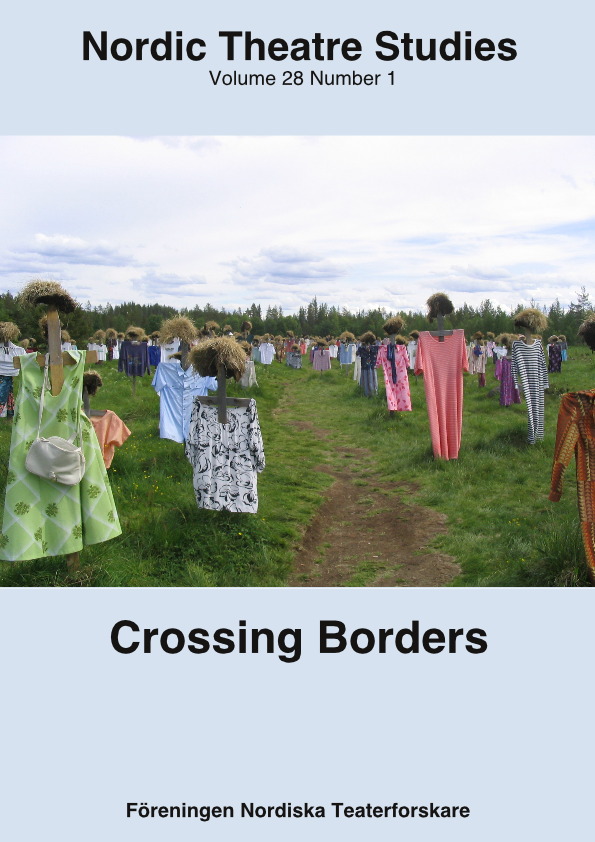Norwegian Political Theatre in the 1970s: Breaking Away from the “Ibsen Tradition”
DOI:
https://doi.org/10.7146/nts.v28i1.23972Keywords:
Political theatre, Norwegian, cabaret, Red Revues, agit-prop-theatre, anti-Aristotelian theatre, independent theatre groups, cultural policyAbstract
The dominant theatre aesthetic in Norwegian theatre has been, and remains at large to be, psychological-realism and the bourgeois “living room drama”. In a Norwegian context this tradition is best represented by Henrik Ibsen’s dramas, staged at Nationaltheatret and Den Nasjonale Scene. However, throughout the 20th century there have been several attempts to break with the “Ibsen tradition”, especially among left-wing political and socially engaged theatre-makers and playwrights such as Gunvor Sartz, Olav Daalgard, and Nordahl Grieg in the 1930s, and Jens Bjørneboe and Odin Teatret in the 1960s. I argue that the clearest and most decisive break with Realism and the Aristotelian dramaturgy, in a Norwegian political theatre context, was made in the late 1970s, instigated by the independent theatre groups Perleporten Teatergruppe and Tramteatret. Their break did not only constitute an aesthetic and dramaturgical break, but also a break in organizational terms by breaking the hierarchy of the institutional theatre ‘machine’. Perleporten Teatergruppe and Tramteatret aimed at making a political, progressive theatre both in form and content. Perleporten and Tramteatret were both inspired by contemporaneous political and experimental theatre in Europe and Scandinavia as well as by the historical avant-garde experiments, and, for Tramteatret’s part, the workers' theatre movement from the 1920s and 30s in their search for a theatre that could express the social and political climate of the day. In this article, I will place Tramteatret and Perleporten Teatergruppe’s debut performances Deep Sea Thriller (1977) and Knoll og Tott (1975) within a historiographical and cultural-political context.
References
Ellen Aanesen, ”Møte med kulturarbeideren Gunvor Sartz.” http://tv.nrk.no/program/FOLA02006882/moete-med-kulturarbeideren-gunvor-sartz, NrK.
Knut Ove Arntzen, 1986, ”Kan det skje noe nytt på Nationaltheatret?”, in Spillerom no. 4.
Knut Ove Arntzen, ”Arktisk drama og landskapsdialoger i scenisk resepsjon: Hamsun, Løveid, Iunker og Fosse – en annerledes norsk dramatikk?”, in Ole Karlsen (ed.): Nordisk samtidspoesi : Cecilie Løveids forfatterskap, Oplandske Bokforlag, Vallset 2016.
Alf Arvidsson, "Vänstervågen Och Populärmusiken 1965-1980," Sociologisk Forskning 42, no. 2, 2005.
Tor Bang, and Under Hammermerket : Hvordan Utvikler Norsk Arbeiderbevegelse En Retorisk Instruksjonslitteratur På 1930-tallet?, Universitetet i Bergen, Institutt for Informasjons- Og Medievitenskap 2013.
Edvard Beyer (ed.) Kultur Og Kulturpolitikk : Norsk Kulturråd - Fortid Og Framtid, Cappelen, Oslo 1985.
Nils Braanaas (ed.) Dramapedagogisk Historie & Teori, 4. Tapir akademisk forl., Trondheim 1999; repr., 2002.
Ivo de Figueiredo, ’Ord/Kjøtt’ Norsk scenedramatikk 1890-2000, Cappelen Damm, Oslo 2014.
Øivind Frisvold, Teatret i Norsk Kulturpolitikk: Bakgrunn og Tendenser Fra 1850 til 1970-Årene. Universitetsforlaget, Oslo 1980.
Tor Egil Førland and Trine Rogg Korsvik, 1968: opprør og motkultur på norsk, Pax, Oslo 2006.
Jostein Gripsrud, "La Denne Vår Scene Bli Flammen" : Perspektiver Og Praksis I Og Omkring Sosialdemokratiets Arbeiderteater Ca. 1890-1940, Universitetsforlaget, Oslo 1981
Runo Hellvin and Maja Lise Rønneberg Rygg, "Fra Skuespiller Til Dramalærer," Drama, 2010.
Karl Hoff, Perleporten Teatergruppe, Gruppas historie, 2009 http://sceneweb.no/nb/multimedia/25339, 5 December 2011, p. 15.
Einar Hovdehaugen, ”Kulturpolitikken sett fra stortingssalen” in Kultur og kulturpolitikk : Norsk kulturråd - fortid og framtid. in Edvard Beyer (ed.) Norsk kulturråd. Cappelen, Oslo 1985.
Egil Jensen, Forvitringen Av Et Kommunistisk Prosjekt : En Kvalitativ Studie Av Utmeldinger I AKP (m-l), 2008.
Finn Jor, Kulturrevolusjon? Gyldendal, Oslo 1968.
Elsa Kvamme. Kjære Jens, Kjære Eugenio : Om Jens Bjørneboe, Eugenio Barba Og Opprørernes Teater, Pax, Oslo 2004.
Jon Arne Madsø, Tramteatret, http://www.musikalske.net/tramteatret/tramteatret.htm. 12th December 2015, 19 January 2016.
Helge Sivertsen: ”Norsk Kulturpolitikk 1945-1965,” Norsk Kulturråd. Kultur Og Kulturpolitikk : Norsk Kulturråd - Fortid Og Framtid, in Edvard Beyer (ed.) Cappelen, Oslo 1985.
Camilla Tostrup, "Danse- Og Teatersentrum 30 år." Stikkordet, 2007.
Downloads
Published
How to Cite
Issue
Section
License
The copyright belongs to the authors and Nordic Theatre Studies. Users can use, reuse and build upon the material published in the journal but only for non-commercial purposes. Users are allowed to link to the files, download the files, distribute the files on a local network (preferably by links), upload the files to local repositories if their institutions require them to do so, but not republish the files without proper agreements with the journal and the author.

